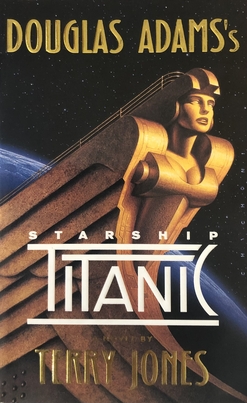 | |
| Author | Terry Jones |
|---|---|
| Publisher | Harmony Books, Pan Books, Ballantine Books |
Publication date | October 1997 |
| Pages | 256 (first edition) |
Douglas Adams's Starship Titanic is a novel written by Terry Jones, based on the game Starship Titanic conceived by Douglas Adams. The novel was published in October 1997 by Harmony Books and Pan Books, and in November 1998 by Ballantine Books.
Contents
The author, Terry Jones, based it on an outline provided by Douglas Adams. [1] Jones, famous for his work with Monty Python, was the voice actor for the parrot character in the original game. Adams initially intended to write the adaptation himself, but was too focused on the game. Robert Sheckley was then approached to write it, but his submitted work was rejected by The Digital Village in Autumn 1997 because it was too different from Adams's writing style. [2] Michael Bywater offered to write the novel after Sheckley abandoned the project, but, due to fears that Bywater would not complete the book on schedule, Adams ultimately asked Jones to write it as publishers expected the book's release to tie in with that of its source material (which itself ended up being delayed). [3] [4] Because of a tight schedule and postponing of the novel, Jones had to write it in the five weeks before its release date. The book sold about 80,000 copies. [3] Gerald Jonas of The New York Times Book Review wrote that Jones "successfully mimics Adams's antic style", but that the novel lacks the qualities that made Hitchhiker's Guide to the Galaxy series "memorable". [5] However, Publishers Weekly praised the book, describing it as a "rich medium of whimsy and satire" and writing that it succeeds in making readers laugh. [6] Reviewing the novel for School Library Journal , Robin Defendall also praised it and wrote that "it will be popular with [Jones's and Adams's] many fans". [7]